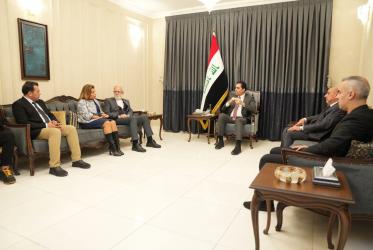The Place of the Church
Soweto Hotel and Conference Centre, 8-11 June 2016
Welcome Message
Dr Isabel Apawo Phiri
Associate general secretary for Public Witness and Diakonia, World Council of Churches
To the president of the South African Council of Churches (SACC), Bishop Zipho Siwa,
SACC acting general secretary, Bishop Malusi Mthanjiswa M. Mpumlwana,
The representative of the executive mayor of Johannesburg, his worship counsellor Parks Tau,
Your excellences, eminences, ecumenical guests,
participants in this consultation,
members of the of the South African Council of Churches,
Dear sisters and brothers in Christ,
It is a pleasure and honour for me to welcome you to this consultation on behalf of Rev. Dr Olav Fykse Tveit, the general secretary of the World Council of Churches (WCC). He is on his way to this consultation and plans to join us from tomorrow morning up to the events of the 11th.
The WCC is a fellowship of 345 churches representing over 500 million Christians in 120 countries “to call one another to visible unity…witness and service to the world and to advance towards that unity in order that the world may believe.”
The WCC is glad to organize this consultation jointly with the South African Council of Churches. The WCC is grateful to the SACC for holding this consultation back to back with the commemoration of the 40th anniversary of the 16 June 1976 massacre of students in Soweto. By inviting all participants in the consultation to the events of 11 June, we wish to promote a shared understanding of South African political history, apartheid and the role of the church in peacebuilding and reconciliation.
In the case of the WCC, our accompaniment of the churches in South Africa has a long history, and it reflects the identity of the WCC. Pursuits of justice and peace have been essential parts of the life and calling of the WCC since its founding in 1948. A good example of accompaniment is the WCC’s Programme to Combat Racism, which was launched in 1969 in response to a 1968 mandate from the council’s 4th Assembly in Uppsala, Sweden. The Assembly declared that the issue of apartheid was a matter of faith and the theological legitimation of apartheid was a heresy. Within the WCC itself, there was opposition to the establishment of a Programme to Combat Racism. But drawing from biblical imperatives, the ecumenical movement was determined to act together against racism. The programme was established, and some churches withdrew their membership from the WCC. In the 1970s and 1980s, the programme played a highly visible and controversial role in the international debate about the apartheid government in South Africa. At the Harare WCC assembly in 1998, President Nelson Mandela acknowledged the contribution of the WCC in bringing apartheid to an end. At the June 2016 WCC Central Committee meeting, the Dutch Reformed Church will become a full member of the WCC again.
The Decade to Overcome Violence (2001-2010) addressed the need to replace violence with a culture of peace, and the WCC's 9th Assembly (Porto Alegre, Brazil, February 2006) decided that, "the conclusion of the Decade be marked by an International Ecumenical Peace Convocation (IEPC),” which took place in Kingston, Jamaica, in May 2011. The IEPC resulted in an “Ecumenical Call for Just Peace,” which promoted a multi-sectorial approach to peacebuilding with the following dimensions:
- Just peace in the community – so that all may live free from fear
- Just peace with the earth – so that life is sustained
- Just peace in the marketplace – so that all may live with dignity
- Just peace among the nations – so that human lives are protected
The WCC 10th Assembly, meeting in Busan, South Korea, under the theme “God of life, lead us to justice and peace,” continued the call for peace with justice. The Assembly also reiterated the key role of WCC as convener and facilitator for global ecumenical peace and advocacy work, and the WCC member churches further committed themselves to mobilize the gifts within the fellowship to raise their collective voice for peace across many countries. This consultation is in line with this role of the WCC and with the churches’ commitment to work together for peace and justice.
The WCC 10th assembly issued an invitation to a pilgrimage of justice and peace. The worldwide fellowship of Christian churches invites all Christians to deepen their relationship with God and each other by joining together in prayer, witness and service for justice and peace. In this pilgrimage the assembly identified the following “priority countries” for special attention: the Korean Peninsula, Syria, Israel/Palestine, Nigeria, South Sudan and the Democratic Republic of Congo. Since 2013, the countries have expanded to include Iraq, Colombia and Burundi. Among the participants here are representatives from most of the WCC priority countries.
Furthermore, the WCC is a convener of the Ecumenical Peace Advocacy Network established in December 2014 in Sigtuna, Sweden, as a method of moving together in the pilgrimage of justice and peace. We shall hear more about this network tomorrow.
As we gather over the next three days in the search for peace and justice within or beyond borders, we want to explore together opportunities for churches of different persuasions to build peace together, to intervene where lives are endangered, to restore human dignity where it is denied, to protect people where the sanctity of life is at risk, to engage all sides where borders divide and to serve as agents of much-needed change.
You are most welcome.




